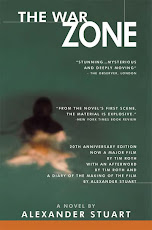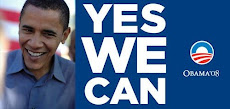It was not an easy decision. It was prompted in no small part by the fact that I am married to an American (or to be more accurate, a Chinese-American, for my wife was born in Taiwan although she grew up in Florida), and even more so by the fact that we became the over-the-moon (I can think of no more accurate description) parents of a son in 2004. A son who is, of course, an American citizen, but with an Anglo-Chinese heritage (or, if you speak to my wife or her parents, Chinese-Anglo), and who already proudly (on our part) holds in addition to an American passport, a British one - thus entitling him, as me, also to European Union citizenship. We hope to get him a Taiwanese passport, too, for we believe that he is, above all and as we all are, a citizen of the world.
A powerful factor for me in becoming a US citizen - and there are, I am sure, Americans who will not approve of this particular point, although they may be far less in number than they think - was the consideration that I did not have to surrender my British citizenship or passport. I did, of course, have to swear an oath of allegiance to the Constitution and laws of the United States and "entirely renounce and abjure all allegiance and fidelity to any foreign prince, potentate, state, or sovereignty of whom or which I have heretofore been a subject or citizen," and I must confess that the renunciation of my allegiance to Britain was not something that came easily to me.
But - and this may be splitting legal hairs here, and at times it almost feels like splitting my own - I did not have to stand (or kneel) before a British Ambassador, Consul, the Queen, or some other high official, and renounce my British citizenship to them. I am fortunate in that both the United States Government and the British Government recognize the concept of dual nationality (the US Internal Revenue Service is less forgiving in its opinion, but that is another matter). US law does not specifically mention dual nationality, but it also does not require a person to choose one citizenship or another. In order to lose US citizenship, for instance, the law requires that a person must apply for foreign citizenship voluntarily, by free choice, and with "the intention to give up US citizenship."
So anyway, I am a citizen of both countries to a greater or lesser extent, but these days - having lived in the US since 1990 and, as I say, being the husband and father of Americans - I feel American: I still speak with a largely British accent (although some here in the US may mistake it for Australian or South African), but I spell American (a big deal for a professional writer), I behave in most respects like many other Americans (for good or bad), and to a large extent, I think American, in that these days I think first about my place in the world as an American, and not as a former inhabitant of that great island nation, Britain.
All of this is by way of being a rather long preamble to the opinions I intend presenting in future columns about the state of America now, and how my feelings about it, while certainly colored by having lived here for eighteen years, are also colored by my experience of having been born and raised in Britain, and having traveled a good deal across all parts of the globe - from the wonders of the Australian Outback to the rugged beauty of the Iranian desert around Isfahan and Persepolis, while also enjoying (for there is nowhere that I have not enjoyed) the sub-tropical humidity and unforgettable people, food and colors of Hanoi and Havana, and the sub-freezing temperatures but equally unforgettable and warmly welcoming people of Barrow, Alaska, the northernmost point on continental North America.
There is a reason that I have called this column A Wolf At The Door, and it is because I sense, with no claim to startling hyper-perception, that America is at a significant turning point in its history, and because, aside from outside threats such as terrorism, which have been vastly overplayed for political reasons over the past seven years of George W Bush's presidency (and I do not mean to dismiss those threats as illusory or minor), many fellow citizens that I talk to, or read, or listen to (primarily on National Public Radio, America's closest equivalent of BBC's Radio 4), express a sense of doubt - verging at times on fear - about the economy and the future direction of this country that I have not previously encountered in my time here.
The economy, clearly, is in a mess, and while it may not prove to make the crash of 1929 look like a "walk in the park," as the Sunday Telegraph recently opined, the historically high level of house foreclosures, top-heavy mortgages, the price of gasoline (although perversely that has dropped in recent weeks) and unemployment all usher in scary echoes of the 1930s and the Great Depression: an era whose own mood was captured in a populist fashion by Walt Disney's stunningly successful and Oscar-winning 1933 short cartoon, The Three Little Pigs, which of course focused on the threat provided by the far more compelling character of the Big Bad Wolf, a figure who came to express, in cartoon form, the horrors of the Depression itself.
I do not believe that we are headed for a depression or even recession on anything like the scale of the 1930s: the world is a different place now, the global economy is far more complex and interdependent, and while the Asian and European market plunge of two weeks' back was a sobering event, I feel confident that the lessons of the 1930s, and economic crises since, are precisely what will prevent us from slipping back into a period of such relentless hard times.
We also have the undeniable excitement, here in the US, of one of the most unpredictable presidential electoral races in living history, with a mixed and open field on the Republican side (not, I confess, the side I favor), and an extraordinary choice between an electrifying African-American candidate, in Barack Obama, and a supremely intelligent and well-equipped woman, in Hillary Clinton, on the Democratic.
But America, and Americans, are not nearly as confident as they were eight years ago (I still cannot comprehend the refusal of Republicans to admit that Bill Clinton's presidency was as close to a golden age as we are likely to come for a very long time), and the Wolf At The Door that I intend writing about is as much a dawning recognition that America's primacy is waning, as the specific economic woes that we may be facing.
A friend - who is a solid representation of middle-class America, born in Washington state and now living, like me, in one of the farther reaches of Los Angeles' canyons - recently told me, as our children ice-skated at an outdoor rink set up in Santa Monica for the holidays (as the Christmas period is referred to here), that he was "so ready for America not to be number one anymore, and to have to endure all the hard knocks and responsibilities that come with that."
Europeans, I know, will argue that America has never fully shouldered its responsibilities as a world leader, and has always acted first in its own best interests - but, truly, which country hasn't? And what I found fascinating was that I had never heard this sentiment uttered before: Americans have always been so proud of their position in the world that to admit for a moment that America's time may be passing (and that is presumptuous: I believe that the US will be a, if not the, major international power for the foreseeable future) would be to seem unpatriotic.
So the Wolf may be at the Door, but equally we may be about to embark on four or eight years of "transformational" politics (to use the word Obama recently used, with some controversy, of Reagan's appeal as a leader), whether in the hands of, I pray, either Barack Obama or Hillary Clinton.
One of the greatest things about living here - and absolutely one of the reasons I moved here, after experiencing the devastating loss of a child to cancer - is America's enduring optimism. And even if times are tough, and get tougher, that is not something that will go away.
America may not always be Number One, but its spirit and energy - as evidenced by Obama's extraordinarily dynamic and inclusive campaign, and his appeal across racial and generational lines - will not die.




